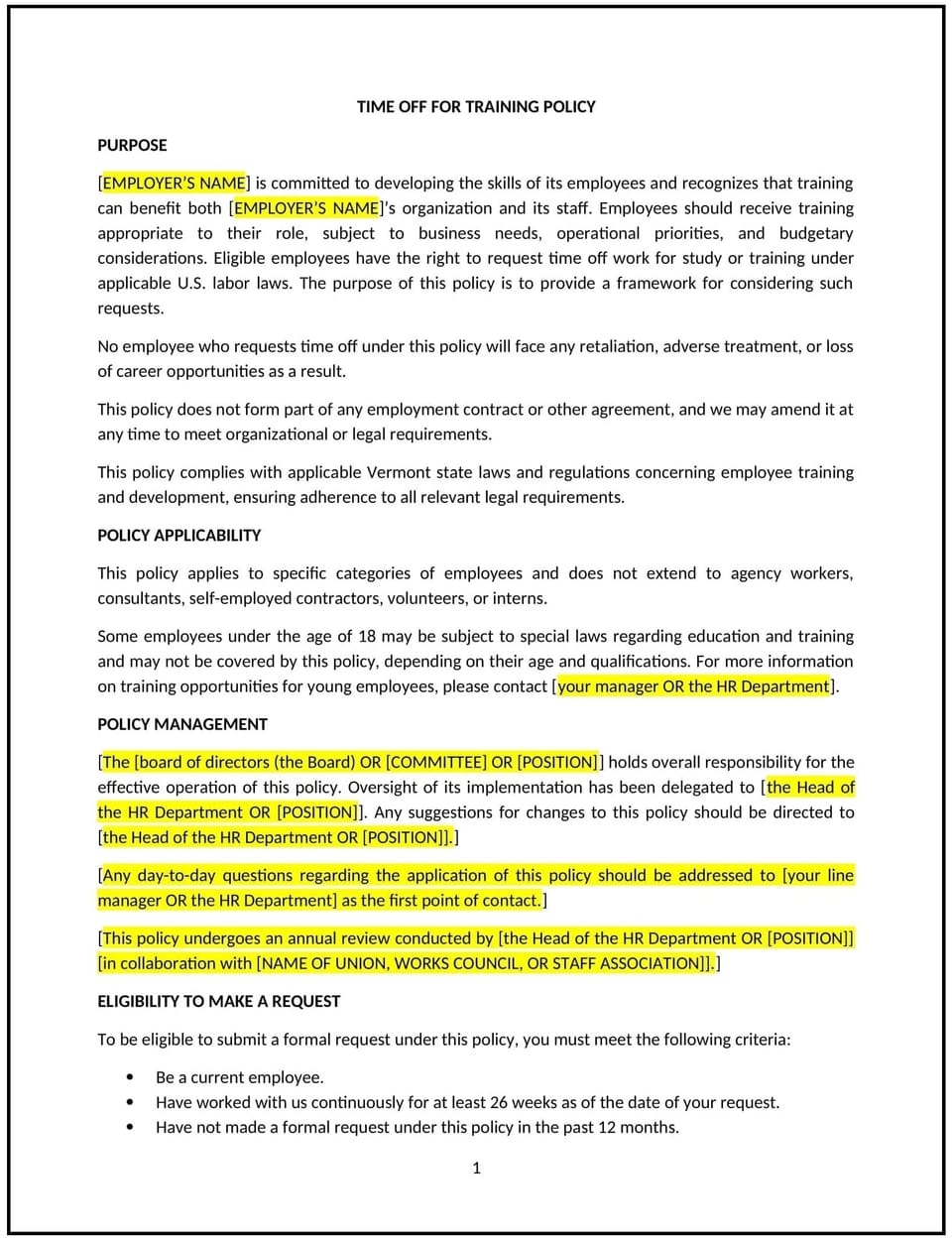Time off for training policy (Vermont): Free template

Time off for training policy (Vermont)
This time off for training policy is designed to help Vermont businesses support employee development by providing time away from regular duties for training or educational opportunities. It outlines guidelines for requesting and approving training-related leave while ensuring alignment with business goals and operational needs.
By adopting this policy, businesses can encourage skill development, improve employee engagement, and maintain compliance with Vermont labor laws.
How to use this time off for training policy (Vermont)
- Define eligible training: Specify what types of training qualify, such as job-related courses, certifications, workshops, or industry conferences.
- Include request procedures: Outline how employees can request time off for training, including advance notice and required documentation.
- Clarify approval criteria: Provide guidelines for evaluating requests, such as the training’s relevance to the employee’s role and the business’s strategic goals.
- Address compensation: Specify whether time off for training is paid or unpaid and if any associated costs will be reimbursed.
- Set expectations for post-training: Require employees to share insights, apply new skills, or provide feedback after completing training.
- Plan for coverage: Encourage managers and employees to coordinate coverage during training absences to minimize workplace disruptions.
- Monitor compliance: Regularly review training leave practices to align with Vermont laws and workplace objectives.
Benefits of using this time off for training policy (Vermont)
This policy provides several benefits for Vermont businesses:
- Enhances employee skills: Supports workforce development and aligns training opportunities with business goals.
- Promotes engagement: Demonstrates the company’s commitment to professional growth and career advancement.
- Ensures transparency: Provides clear guidelines for requesting and approving training leave.
- Reduces disputes: Establishes a consistent approach to managing training-related absences.
- Improves retention: Fosters a supportive workplace culture that values employee development.
Tips for using this time off for training policy (Vermont)
- Communicate the policy: Share the policy with employees during onboarding and include it in internal resources, such as the employee handbook.
- Encourage proactive planning: Advise employees to request training leave well in advance to allow for scheduling adjustments.
- Track training outcomes: Maintain records of completed training sessions and assess their impact on employee performance and business goals.
- Support cost-sharing: Offer financial assistance or reimbursements for approved training to encourage participation.
- Update regularly: Revise the policy to reflect changes in Vermont laws, industry trends, or company objectives.
Q: What types of training are eligible under this policy?
A: Eligible training includes job-related courses, certifications, workshops, seminars, and industry conferences that align with the employee’s role or the company’s goals.
Q: Is time off for training paid?
A: Time off for training may be paid or unpaid, depending on the nature of the training and company policy. Any reimbursement for associated costs should also be outlined.
Q: How should employees request time off for training?
A: Employees should submit a formal request to their manager or HR, including details about the training, such as dates, location, and relevance to their role.
Q: How can businesses evaluate training requests?
A: Businesses should evaluate requests based on the training’s relevance, its alignment with company objectives, and the potential impact on employee development.
Q: Are employees required to share insights from training?
A: Yes, employees may be asked to share insights, apply new skills, or provide feedback to ensure the training benefits the organization.
Q: How should businesses handle coverage during training absences?
A: Managers should coordinate with employees to adjust schedules, redistribute tasks, or arrange temporary coverage to minimize disruptions.
Q: How often should this policy be reviewed?
A: This policy should be reviewed annually or whenever significant changes occur in Vermont laws, industry standards, or workplace practices.
Q: Does this policy apply to part-time employees?
A: Yes, part-time employees may also be eligible for training-related leave, but the policy should specify any eligibility criteria or restrictions.
This article contains general legal information and does not contain legal advice. Cobrief is not a law firm or a substitute for an attorney or law firm. The law is complex and changes often. For legal advice, please ask a lawyer.


